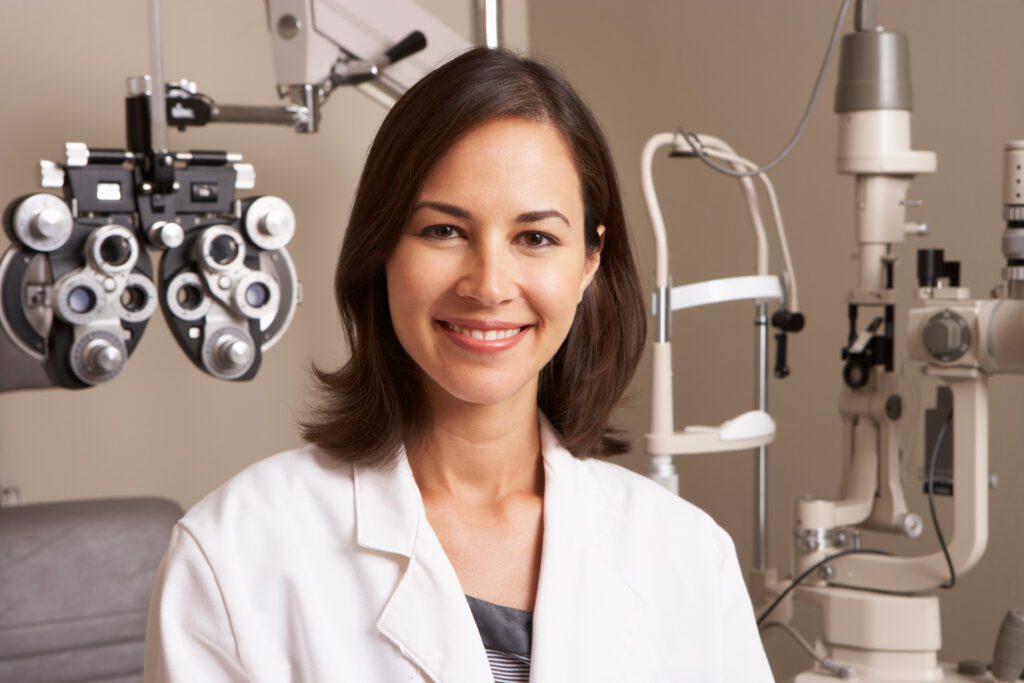When considering a career in eye care, it’s important to understand the roles of professionals who contribute to eye health. Choosing between an optometrist and an ophthalmologist can be critical, whether you’re looking to provide vision care or diagnose and treat serious eye conditions. This blog will compare the careers of ophthalmologists and optometrists, providing a comprehensive analysis to answer the question of which path offers greater job security.
Understand the Career paths: Optometrists vs Ophthalmologists
Optometrist
Optometrists are primary eye care professionals who diagnose and manage vision problems, prescribe eyeglasses or contact lenses, and treat common eye conditions like glaucoma and dry eye. They provide routine eye exams and non-surgical treatments, working closely with ophthalmologists for advanced care.
Ophthalmologist
Ophthalmologists are medical doctors specializing in both medical and surgical treatment of complex eye diseases. They perform eye surgeries, treat conditions like cataracts and macular degeneration, and provide comprehensive care.
Pros and Cons of Each Career Path
Optometrist
- Pros:
- Shorter, more affordable educational path (8 years of study).
- Flexible work environments, including private practices, retail chains, and part-time locum positions.
- Growing demand for routine eye care, especially among aging populations.
- Cons:
- Limited scope compared to ophthalmologists (no surgical procedures).
- Lower earning potential, with salaries typically lower than those of ophthalmologists.
Ophthalmologist
- Pros:
- Broader scope of practice, including the ability to perform surgeries.
- Higher income potential, with salaries averaging $375,000 or more annually.
- Opportunities to specialize in high-demand areas like retina or cornea surgery.
- Cons:
- Requires a significantly longer and more expensive educational path (12–14 years).
- Demanding residency programs and additional fellowship training.

Role Comparison: Optometrist vs Ophthalmologist
Education and Training Timeline
Optometrists complete 8 years of education: a 4-year undergraduate degree followed by a 4-year Doctor of Optometry (OD) program from a school accredited by the Accreditation Council on Optometric Education (ACOE). Residency is optional for specialization. Ophthalmologists complete 12-14 years: a 4-year undergraduate degree, 4 years of medical school, 3-4 years of residency programs accredited by the Accreditation Council for Graduate Medical Education (ACGME), and 1-2 years of fellowship for sub-specialization. Ophthalmology is a longer, more costly path.
Work Environments
Optometrists work in private practices, retail chains, clinics, or hospitals, often with flexible part-time or locum opportunities. Ophthalmologists typically work in hospitals, private practices, or academic centers, where they perform surgeries and may be involved in research or teaching. The environments reflect their specialized roles and responsibilities.
Patient Demographics
Optometrists primarily serve patients aged 40+, focusing on routine eye exams and vision correction. They also work with younger patients for glasses or contact prescriptions. Ophthalmologists, however, mainly treat older adults with age-related conditions like macular degeneration and cataracts, but also handle congenital conditions and complex cases requiring surgery or advanced treatment.
Scope of Practice
Optometrists focus on primary eye care, providing routine eye exams, prescribing glasses, and managing common eye conditions like glaucoma and dry eye. Ophthalmologists, as medical doctors, specialize in diagnosing and treating complex eye diseases, performing surgeries, and managing severe conditions like cataracts, macular degeneration, and diabetic retinopathy.
Career Advancements
Optometrists can specialize in areas like ocular disease or pediatric optometry, open private practices, or take on leadership, teaching, or research roles.
Ophthalmologists can pursue fellowships in retina or glaucoma surgery, become medical directors, or engage in research and innovation, contributing to advancements in surgical techniques and medical technologies.
Job Outlook & Demand
According to the Bureau of Labor Statistics (BLS), both optometrists and ophthalmologists are expected to see job growth by 2031, though at different rates.
- Optometrist Job Growth: 9% by 2031, driven by increasing demand for routine eye care and an aging population.
- Ophthalmologist Job Growth: 7% by 2031, influenced by the growing need for specialized treatments for conditions such as cataracts, macular degeneration, and glaucoma.
Both professions offer strong job security due to the increasing need for eye care as the population ages.
Future Employment Trends
Demand for optometrists is growing, especially in retail and primary care settings, driven by an increased need for routine eye care and automated eye exam technologies. Ophthalmologists are also in high demand due to the aging population and rising eye disease cases like glaucoma and diabetic eye conditions. Both roles will be shaped by AI optometrists through automation and ophthalmologists through advancements in robotic surgery and imaging. Technology will enhance efficiency but require continual skill updates in both fields.
Which Career Offers Greater Job Security?
Both optometrists and ophthalmologists offer solid job security, but the factors contributing to that security differ.
Optometrists are increasingly in demand due to a growing need for routine eye care, eye exams, and management of conditions like glaucoma and dry eye, particularly among the aging population. With a projected 9% job growth by 2031, flexible work environments (retail, private practice, clinics), and a faster, less costly educational path, optometry offers a stable and accessible career.
Ophthalmologists, as medical doctors who can diagnose and perform eye surgery, are vital for treating serious eye diseases. Their job security is reinforced by a 7% projected growth, driven by rising rates of diabetic eye conditions, macular degeneration, and surgical demand. Although they face longer training, higher costs, and potential private practice expenses, their specialized skills ensure continued need in hospitals, surgical centres, and private clinics, making ophthalmology a secure long-term career for those prepared for the investment.
Conclusion
Both optometrist and ophthalmologist careers offer strong job security due to growing demand for vision care. Optometry offers a shorter, cost-effective path with flexibility, while ophthalmology provides higher earnings and long-term stability for those willing to invest in extensive training. Your choice should align with your goals and interests.
Looking to pursue a career in eye care?
At Verovian Optical Recruitment Agency, we specialize in matching skilled optometrists and ophthalmologists with leading practices and healthcare organizations. Whether you're exploring new roles, seeking career progression, or looking for the right practice fit, our expert team is here to support your journey. Contact us today and discover opportunities that align with your professional goals.




